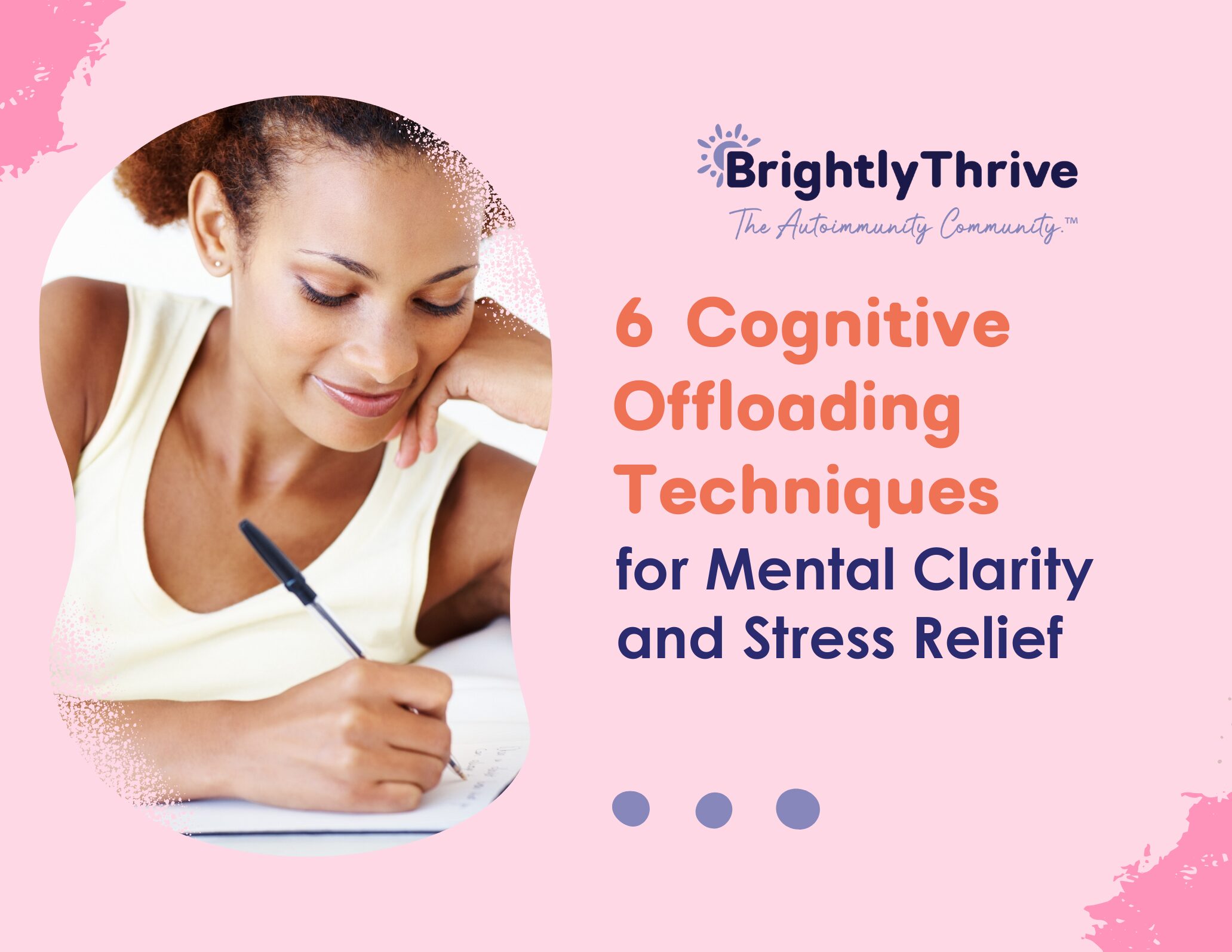
6 Cognitive Offloading Techniques for Mental Clarity and Stress Relief
Our mental energy is like the body’s currency—a limited resource that fuels decision-making, focus, and creativity. When drained, it leaves us overwhelmed, stressed, and unable to prioritize what truly matters, like health and wellness. The good news? You can conserve this energy and free your mind using cognitive offloading techniques. It’s a budget-friendly biohacking strategy designed to simplify your day, reduce stress, and boost mental clarity. Let’s explore how it works and how you can use it to support your well-being.

ThriveGuide™ Bridget
“Creating space in your mind and body isn’t just about getting things done—it’s about stepping out of the chaos and into clarity. It’s where focus replaces overwhelm, and presence becomes the foundation for healing and thriving.” – ThriveGuide Bridget
What Is Cognitive Offloading?
Cognitive offloading is the practice of transferring mental tasks to external tools or systems to reduce cognitive load. Think of it as outsourcing decisions or reminders to create space in your brain. By using these techniques, you save energy for more important tasks, leading to greater focus and less stress.
In simpler terms, it’s about making your brain’s job easier by leveraging tools like lists, apps, or systems to manage the small stuff.
Why Cognitive Offloading Matters for Mental Clarity
Our brains make up to 35,000 decisions a day, from choosing what to wear to tackling complex work tasks. Even the smallest decisions chip away at your mental energy, leaving you fatigued by midday. Cognitive offloading helps you conserve that energy by automating or externalizing repetitive tasks.
Key Benefits:
- Reduced stress: Fewer decisions mean less mental clutter.
- Improved focus: Your brain can zero in on what matters most.
- Better mental clarity: Organizing thoughts externally leads to sharper decision-making.
- More time for wellness: Spend less time juggling tasks and more time investing in your health.
Cognitive Offloading Techniques for Everyday Stress Relief
1. Create a Mental Parking Lot
Ever had random thoughts interrupt your focus? Capture them instead of letting them hijack your day.
- Use a Notes app, voice memo, or physical notebook to jot down ideas, to-dos, or reminders.
- Bookmark articles or save them in Pinterest boards for later reference.
This technique helps you stay present and focused without losing track of important tasks.
2. Use Journaling for Mental Clarity
Journaling is a powerful way to offload thoughts and organize your mind.
- Try “Morning Pages”: Free-write three pages each morning to declutter your thoughts.
- Use journaling before bed to release worries and prepare for restful sleep.
By writing things down, you process emotions and externalize rumination, reducing stress and gaining clarity.
3. Block Your Time
Time blocking is like decluttering your schedule. Assign specific tasks to designated time slots to create structure and ease.
- Batch similar activities, like answering emails or running errands, into one time block.
- Reserve mornings for tasks requiring high focus and afternoons for lighter activities.
- Condense appointments and errands into specific days to save energy and travel time.
Time blocking limits distractions, boosts productivity, and reduces decision fatigue.
4. Make Decisions in Bulk
Planning ahead saves significant mental energy.
- Meal Prep: Plan weekly meals and grocery shop accordingly.
- Outfit Organization: Lay out outfits for the week to simplify mornings.
- Scheduling: Decide on chores, workouts, and appointments for the week in advance.
By making decisions once, you avoid the drain of repeating them daily.
5. Build Repeatable Systems
Create systems for recurring tasks to eliminate guesswork.
- Use a chore chart for housework.
- Set a weekly routine for meal prep or grocery shopping.
- Establish a workout schedule that fits seamlessly into your week.
These systems become habits over time, freeing mental space for other priorities.
6. Leverage Technology
Modern tools make cognitive offloading easier than ever.
- Apps for Task Management: Use Asana, Trello, or even a simple Notes app to organize tasks.
- Meal Planning Tools: Apps like Resa Me can import recipes and generate grocery lists in seconds.
- AI Assistance: Use tools like ChatGPT for brainstorming or drafting plans.
Let technology handle the details while you focus on bigger goals.
Why Cognitive Offloading Is Key for Stress Relief and Autoimmune Healing
Cognitive offloading isn’t just about saving time—it’s about creating space for healing. For those navigating autoimmune challenges, mental clarity and stress reduction are essential to overall wellness. Simplifying routines and externalizing decisions not only lightens your cognitive load but also gives your body the calm it needs to repair and restore. By creating ease in your mind, you’re creating a more supportive environment for your body to heal.
The best part? These techniques are cost-effective, accessible, and tailored to fit seamlessly into your day-to-day life. They’re tools that empower you to focus on the things that truly matter, like nurturing your health and embracing joy.
Start Your Cognitive Offloading Journey Today
Ready to give cognitive offloading a try? Start with one simple technique—like journaling to quiet your mind or time blocking to reduce decision fatigue. Notice how it helps you feel less overwhelmed and more in control. Once you feel the difference, add another tool to your wellness toolkit.
By gradually integrating cognitive offloading into your life, you’ll create a system that supports mental clarity, reduces stress, and promotes autoimmune healing. Your mental energy is precious—conserve it with intention and use it to fuel your journey toward thriving.
What better way is there to mentally prepare ourselves for the coming year than to cognitively offload our way to health? Want to learn more and receive guidance from The Autoimmunity Community™ that truly gets you? Try BrightlyThrive for 30 days risk-free!
🌿 What’s your favorite way to simplify your day? Share your tips and experiences in the comments below—we’d love to hear from you!
References
Williams, R. (2018, December 13). How Neuroscience Can Help Us Make Better Decisions – Ray Williams. Ray Williams. https://raywilliams.ca/neuroscience-can-help-us-make-better-decisions/
MacFarlane, N. (2023, September 6). 17 Tips To Stop Looping Thoughts When Your Brain Gets Stuck. A Conscious Rethink. https://www.aconsciousrethink.com/24885/stop-looping-thoughts/
Calm Editorial Team. (2024, April 18). How to journal for mental health: 7 tips to get started — Calm Blog. Calm Blog. https://blog.calm.com/blog/how-to-journal-for-mental-health
Time Blocking — Your Complete Guide to More Focused Work. (n.d.). Todoist. https://todoist.com/productivity-methods/time-blocking
Meal Prep Guide. (2024, December 4). The Nutrition Source. https://nutritionsource.hsph.harvard.edu/meal-prep/
Jones, J. (2024, November 14). Repeatable Systems Turn Your Goals Into Reality. Way We Do. https://www.waywedo.com/blog/repeatable-systems-goals-reality/
Cognitive Offloading: The Memory Benefits and Drawbacks of Using Technology to Store Limitless Information – Psychology in Action. (n.d.). https://www.psychologyinaction.org/2020-8-9-cognitive-offloading-the-memory-benefits-and-drawbacks-of-using-technology-to-store-limitless-information/
TAGS:
CATEGORIES:






